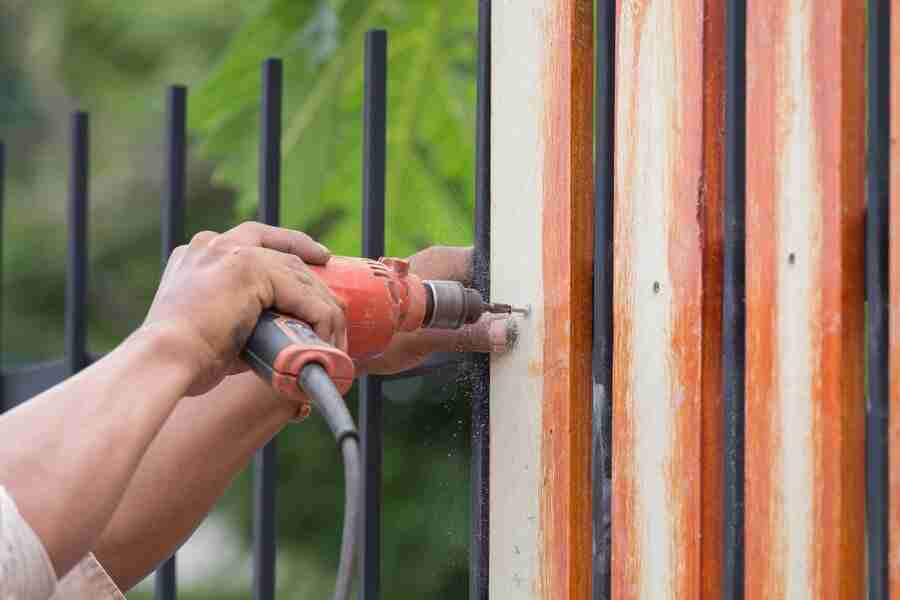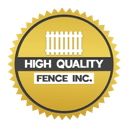What Are the Most Durable Fence Materials?

When it comes to choosing a fence for your property, durability is often a top priority. A fence not only enhances the aesthetics of your home but also provides security and privacy. With a variety of materials available, selecting the most durable option can be crucial for ensuring longevity and minimizing maintenance costs over time. Let’s explore some of the most durable fence materials to help you make an informed decision.
Vinyl Fencing
Vinyl fencing has gained popularity in recent years due to its durability and low maintenance requirements. Made from PVC (polyvinyl chloride), vinyl fences are resistant to rotting, warping, and insect damage. They are also highly weather-resistant, capable of withstanding harsh elements such as rain, snow, and UV rays without fading or deteriorating.
One of the key advantages of vinyl fencing is its longevity. With proper installation and minimal upkeep (usually limited to occasional cleaning with soap and water), a vinyl fence can last for decades. It doesn’t require painting or staining, which saves both time and money in the long run. Vinyl fences come in a variety of styles and colors, offering flexibility to match different architectural styles and personal preferences.
Wood Fencing
Wood has been a traditional fencing material for centuries, prized for its natural beauty and versatility. While wood fences require more maintenance compared to vinyl or metal options, they can still be highly durable if properly cared for. Cedar and redwood are popular choices for wood fencing due to their natural resistance to rot and insects.
To enhance durability, it’s essential to treat wooden fences with a water-repellent preservative or stain. This helps protect the wood from moisture and UV damage, extending its lifespan significantly. Regular inspections and repairs of any damaged or rotted sections are also crucial to prevent further deterioration.
Aluminum Fencing
Aluminum fencing combines strength with a lightweight structure, making it an excellent choice for both residential and commercial properties. Aluminum is naturally resistant to rust and corrosion, making it ideal for regions with high humidity or coastal environments where salt exposure can be an issue.
Unlike iron or steel fences, aluminum fences do not require painting or coating to maintain their appearance and durability. They are available in a variety of styles, from decorative to simple designs, offering flexibility in both security and aesthetic preferences. Aluminum fences are also easy to install and can last for decades with minimal maintenance beyond occasional cleaning.
Chain Link Fencing
Chain link fencing is known for its affordability, strength, and durability. Made from galvanized steel wire, chain link fences are resistant to rust and corrosion, making them suitable for a wide range of climates. They are often used in residential, commercial, and industrial settings where security and visibility are priorities.
While chain link fences may not offer the privacy or aesthetic appeal of other materials without additional slats or fabric inserts, they are highly durable and require little maintenance. Regular inspections for rust or damage, along with prompt repairs, can help prolong the lifespan of a chain link fence.
Composite Fencing
Composite fencing is a relatively newer option that combines the benefits of wood and plastic. Typically made from recycled materials, composite fences are resistant to rot, decay, and insect infestation, making them highly durable and eco-friendly. They require minimal maintenance, as they do not need to be painted, stained, or sealed.
Composite fencing comes in various styles and colors, mimicking the look of wood or providing a contemporary aesthetic. It is resistant to fading and warping, even in harsh weather conditions. While initially more expensive than some traditional materials, composite fencing can offer long-term savings due to its durability and low maintenance requirements.
Choosing the Right Material for Your Needs
When selecting a fence material based on durability, consider factors such as your climate, maintenance preferences, budget, and desired aesthetic. Each material has its own strengths and considerations, so it’s essential to weigh these factors carefully.
For example, vinyl and aluminum fences are excellent choices for low-maintenance durability, while wood and composite fences offer natural beauty with varying levels of required upkeep. Chain link fencing provides durability at a lower cost but may not suit every aesthetic preference or privacy need.
Maintenance Tips for Longevity
Regardless of the material you choose, regular maintenance is key to maximizing durability:
- Inspect regularly: Check for signs of damage, rust, or wear and tear.
- Clean as needed: Remove debris and dirt buildup, especially in areas prone to moisture.
- Repair promptly: Fix any damaged or loose components to prevent further deterioration.
- Apply treatments: Treat wood fences with protective coatings or stains as recommended.
Discover Which Fence Materials Offer Long-Term Durability
When considering the longevity of fence materials, several options stand out for their durability and minimal maintenance requirements. Vinyl fencing, crafted from polyvinyl chloride (PVC), has gained popularity for its resilience against rot, warping, and insect damage. It’s particularly favored in areas prone to high moisture or extreme weather conditions. With its ability to withstand UV rays without fading, vinyl fences often come with lengthy warranties, making them a reliable long-term investment.
Another top contender is aluminum fencing, known for its lightweight yet sturdy build. Resistant to rust and corrosion, aluminum fences are ideal for coastal regions or humid climates. They require little upkeep beyond occasional cleaning, making them a practical choice for homeowners looking to minimize maintenance tasks while ensuring durability and security.
Exploring Top Choices for Durable Fencing Materials
In the realm of fencing materials, wood remains a classic option appreciated for its natural beauty and versatility. Species like cedar and redwood are particularly prized for their inherent resistance to rot and insects, provided they are treated and maintained properly. While wood fences may require more maintenance compared to vinyl or aluminum, regular care such as staining and sealing can significantly prolong their lifespan.
For those prioritizing affordability and strength, chain link fencing presents a durable solution. Made from galvanized steel wire, chain link fences are resilient against rust and can withstand harsh weather conditions. Although they are typically used in commercial and industrial settings for security purposes, chain link fences can also be customized with privacy slats or fabric inserts for residential properties seeking both durability and privacy.
The Best Materials for Building Long-Lasting Fences
Composite fencing has emerged as a sustainable alternative that blends wood fibers and recycled plastic. This eco-friendly option offers durability similar to vinyl without the risk of rotting or splintering, making it suitable for various climates. Composite fences require minimal maintenance and are resistant to fading, warping, and insect damage, making them a practical choice for homeowners seeking a low-maintenance yet durable fencing solution.
Each of these materials offers distinct advantages in terms of durability, maintenance, and aesthetic appeal. By understanding their unique properties and considering factors such as climate and budget, homeowners can make informed decisions when selecting a fence material that best suits their needs for long-lasting durability.
Learn About the Most Resilient Fence Materials Available
When it comes to durability in fencing materials, several options stand out for their resilience and ability to withstand various environmental conditions. Vinyl fencing tops the list with its exceptional resistance to moisture, rot, and insects. Made from PVC, vinyl fences require minimal maintenance and retain their color and shape over time, making them a reliable choice for homeowners looking for a long-lasting fencing solution.
Aluminum fencing is another highly resilient option, known for its lightweight yet sturdy construction. Resistant to rust and corrosion, aluminum fences are ideal for coastal areas or regions with high humidity. They offer a sleek and modern appearance without the need for frequent upkeep, making them a practical choice for those seeking durability combined with aesthetic appeal.
Choosing the Right Fence: Materials Known for Durability
Selecting the right fence material involves considering factors such as climate, maintenance requirements, and desired aesthetics. Wood fencing, despite its traditional appeal, requires regular maintenance to prevent rot and decay. Cedar and redwood are popular choices for their natural resistance to insects and weathering, but they benefit from periodic staining or sealing to prolong their lifespan.
For those prioritizing durability and security, chain link fencing provides a cost-effective solution. Made from galvanized steel, chain link fences are durable and require minimal maintenance beyond occasional inspections for rust. They are versatile in application, suitable for both residential and commercial properties where visibility and security are essential.
A Guide to Selecting Durable Fence Materials
Choosing durable fence materials involves assessing their strength, longevity, and maintenance requirements to ensure they meet your specific needs. Composite fencing, composed of recycled materials and plastic, offers a sustainable and durable alternative to traditional wood. It resists warping, fading, and insect damage, making it a low-maintenance option suitable for various climates.
By understanding the unique properties of each material and evaluating factors like budget and aesthetic preferences, homeowners can make informed decisions when selecting a fence that enhances security, privacy, and curb appeal while standing the test of time. Whether opting for the resilience of vinyl, the classic charm of wood with proper upkeep, or the modern durability of composite or aluminum, choosing the right fence material ensures a durable and attractive addition to your property for years to come.
Choosing the most durable fence materials is essential for ensuring the longevity, security, and aesthetic appeal of your property. Each option—whether it’s the low-maintenance resilience of vinyl, the classic beauty of wood with proper care, the modern durability of composite, or the sleek functionality of aluminum or chain link—offers distinct advantages to meet your specific needs and preferences. Understanding factors like climate, maintenance requirements, and budget can guide you toward the best choice for enhancing your home’s curb appeal and security for years to come.
If you’re ready to invest in a durable fence that complements your property, High Quality Fence is here to help. Located at 1112 N. Main Street #171 in Manteca, CA, you can reach us at 209-815-9015. Our team specializes in providing expert advice and installation services tailored to your fencing needs. Contact us today to explore our range of durable fence materials and find the perfect solution for your home.


